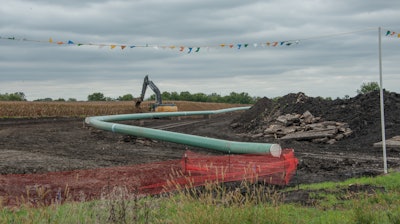
BISMARCK, N.D. (AP) — North Dakota regulators on Wednesday approved an agreement settling allegations that the Texas-based builder of the Dakota Access pipeline violated state rules during construction.
The agreement worked out by attorneys for the Public Service Commission and Energy Transfer Partners calls for development of a "how-to" manual and the planting of more than 100,000 trees, but it doesn't include either a $15,000 fine or a $15,000 "payment" proposed earlier by regulators. ETP also is not required to admit to any liability under the deal.
"This really is not as much about the monetary amount as it is about awareness and influencing future behavior," Commissioner Brian Kroshus said, adding that he believes the provisions of the settlement will cost ETP in excess of $100,000.
The company didn't immediately respond to an Associated Press request for comment. PSC attorney Zachary Pelham said the company had given verbal agreement and was to officially sign the deal later Wednesday.
The commission last fall accused ETP of improperly reporting the discovery of American Indian artifacts, which were not disturbed. The company reported the incident to the State Historic Preservation Office, but ETP didn't get the required approval for the route change from the commission. Regulators also were looking into whether crews removed too many trees and mishandled some soil removed while laying pipe in the state.
The deal the PSC approved Wednesday calls for ETP to help develop and promote an industry manual for handling artifacts discoveries, and to plant many more trees along the pipeline route than the company had proposed. The company also must address any landowner concerns about soil remediation.
The $3.8 billion pipeline began moving North Dakota oil through South Dakota and Iowa to a distribution point in Illinois on June 1.
The artifacts complaint arose when the PSC learned that pipeline crews in October 2016 had diverted construction of the pipeline around Native American artifacts. The tree and soil issue arose in December and had not yet risen to the level of a formal state complaint. The commission on Wednesday canceled a public hearing on the matter next month that could have led to a complaint and a possible fine of up to $200,000.
ETP has denied doing anything intentionally wrong and fought disciplinary action by the commission for months, during which the commission held three executive sessions on the matter that were closed to the public. The settlement negotiations also were slowed by Hurricane Harvey in Texas. ETP is based in Dallas but has facilities on the Gulf Coast, and the company dedicated about 1,000 employees to a hurricane response team.
Commissioner Julie Fedorchak said she and her colleagues believe the settlement results in "more meaningful initiatives than just a flat-out fine."
"This in my opinion actually addresses the potential harm that was at stake here in a more meaningful way, in a more direct way," she said.






















